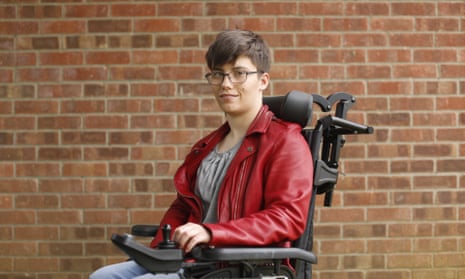Sean Cullen avoided getting a diagnosis for his dyslexia until he was in his second year at university. “The stigma around students not wanting to disclose disability is big. They think it will be detrimental to their studies if they have a difficulty,” says Cullen, who is now studying for a PhD at Brunel University, while also working as a disability officer for the students’ union.
Cullen, who became physically disabled as a result of an accident prior to attending university, is now receiving the support for his dyslexia he should have had from the start. “The message has been drummed in that because you have additional needs you’re not going to perform as academically well. That’s not the right message.”
While university is more accessible than ever before, with almost half of young people in England going on to higher education, people with disabilities and special educational needs are still far less likely to attend. It’s not due to their academic capabilities, but because of low expectations. Research from 2018 revealed disabled students are 10% more likely to have low educational expectations than their non-disabled peers with similar school performance.
This year, universities minister Chris Skidmore called on universities to do more to bridge this gap by supporting and encouraging applications from students with disabilities.
“Inclusion is vital,” says Ross Renton, pro vice-chancellor at the University of Worcester, which was singled out by Skidmore for leading the way in its support services. “As institutions we should reflect society, we should enable people to have fulfilling lives.”
Renton encourages students to have a clear understanding of what support is available even before applying. At Worcester, for example, there are disability advisers so students can arrange support services and work out their needs. Charity AccessAble also maps out the sites and cities on an app, so students with disabilities can work out good, accessible routes to take around campus. By having these conversations, “your disability isn’t a barrier, you’re on a level playing field with everyone else”, Renton says.
“Unfortunately the nature of having any of these conditions is that life will be more difficult,” says Cullen, “but the more you can speak to people, the more solutions you can get out of it.”
Emma Dobson, 22, is a final-year psychology and sociology undergraduate at Brunel
Moving to London for university was a big deal. I hadn’t lived by myself before and my mum had been my primary carer since I was born. The biggest issue was making sure I could get around everywhere – I’m an electric wheelchair user for the most part, and I have cerebral palsy.
Brunel is one campus and it’s mostly flat, so once I knew where I was going and which routes to use, it was better. You could be on campus and not leave for a week and you’d be fine – they have shops, cafes, a nightclub.
Before I started, we spoke to an adviser about my requirements. For example, I need accommodation with automatic doors. I went for the option without carers, to throw myself in at the deep end. I had friends in my first year who offered to help, so I knew I had that backup on campus.
I’m much more confident now, as I’ve learned you have to self-advocate and point out issues so you get what you need, like when the lift wasn’t working and I couldn’t get to my lecture.
I was a big member of the rock and metal society – I love going to concerts. I knew I could talk about that quite easily, and the disability stuff didn’t have to come into it.
Dobson’s blogs at Invincible Woman on Wheels about her experiences
